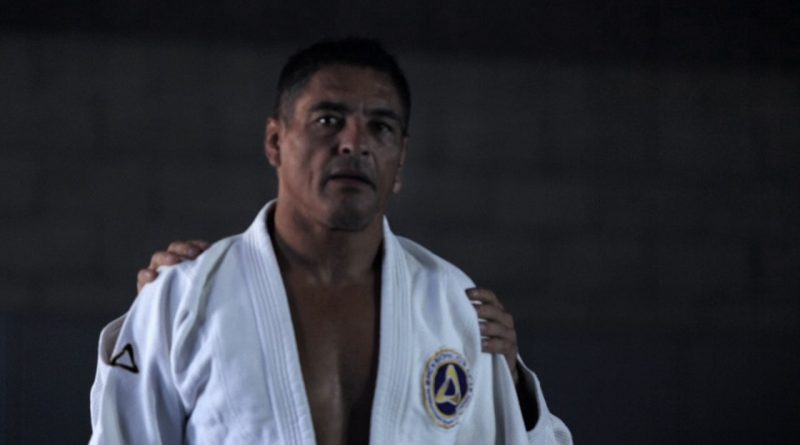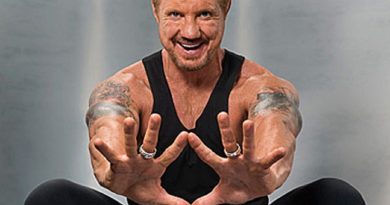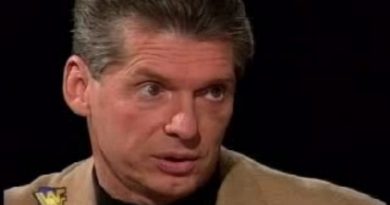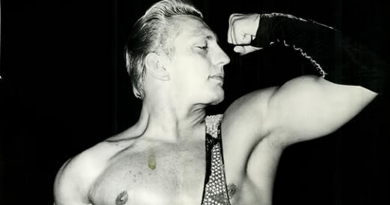Rickson Gracie vs Yoji Anjo
Date: December 7, 1994
Loation: Gracie Jiu Jitsu Academy in Santa Monica, CA
Source: Wrestling Observer Newsletter, Budovideos.com, Bjjee.com
This was a very famous grandstand challenge by Yoji Anjo to Rickson Gracie that ended in a very bad way, backfiring to the point it has become among the most legendary stories in the history of mixed martial arts.
Rickson was the older brother of Royce Gracie, and was believed to be the best of all the Gracie sons. Royce was riding a wave of notoriety following his success in UFC, which had debuted a year earlier. The Gracie name became particularly famous in Japan, at a time when “shoot” promotions like UWF-I were gaining popularity. UWF-I was not a shoot, but it was promoted strongly as such, with a much stiffer working style than All Japan and New Japan.
UWF-I made challenges to other promotions, with the idea that they’d be ignored, and thus UWF-I could be marketed as “real” and that the other champions were scared to face their champions. Rickson had just won a Vale Tudo tournament in Tokyo (similar to UFC), so UWF-I issued challenges to both he and Royce to face their champion, Nobuhiko Takada. UWF-I had just paid Vader a lot of money to submit to Takada, to get him over as the real deal. Negotiations were going on with Rickson for a match with Takada, but things fell apart once Rickson learned it would be a worked pro wrestling match, and he didn’t want anything to do with that.
Yoji Anjo was an undercard wrestler with UWF-I who had the reputation as their best real submission fighter. Anjo issued a challenge to Rickson as well, feeling he was nine years younger and 45 pounds heavier, and thus would be able to easily beat him. He held a press conference in November of 1994, claiming he could beat Rickson in less than a minute.
Anxious to make a name for himself, Anjo flew to California with the idea of challenging Rickson at his own gym in person. Anjo felt that Rickson wouldn’t accept, feeling he didn’t know anything about Anjo. Anjo was also overly confident in his abilities and the size difference. He was involved in some of the booking for UWF-I, and played a big part in the grandstand challenges as a marketing concept.
The stakes were huge. If Anjo backed down Rickson, or better yet, beat him, he’d be a national hero in Japan. He’d became an instant star and UWF-I would benefit immensely.
And Anjo did become famous overnight. Unfortunately for him, it wasn’t for the reasons he had hoped.
Anjo showed up at the gym with a big van full of Japanese reporters. He went inside and asked for Rickson, but he was at home. His son Rockson, who was about 11 years old, along with whoever was running the gym in Rickson’s absence, called him at home. Without hesitation, Rickson drove down to his gym, taping his fists along the way because he knew there would be trouble.
Rickson arrived and saw the van, and saw a large man in a suit (Shinji Sasazaki). The man greeted him and told him how Anjo was here to challenge him. Rickson had made comments in the press that he didn’t want to do a fixed fight, and that if anyone from UWF-I wanted to fight him, they could do it for free in the street or in his gym. And here it was, happening. A famous quote Rickson gave was, “If we fight for money, I’ll stop hitting me when you ask me to. If we fight for honor, I’ll stop hitting you when I feel like it.”
Anjo came out and agreed to fight him in the gym, but Rickson insisted on no reporters in the room. He didn’t want the story manipulated in any way. He also asked Anjo to sign a waiver, to which Anjo consulted with his group and asked about it. Rickson agreed to fight without any waiver, and they closed the door with the reporters waiting on the outside, and only the students in the gym were able to witness it. One student filmed the fight on a videocamera.
The video has never been released, although Rickson has said he will do so one day. Those who saw it have given descriptions that matched exactly with descriptions that were given at the time it happened. They traded a few kicks at first, and then Rickson got the clinch, took him down, and got a full mount. For about five to seven minutes, he unloaded with punches to Anjo’s face. Anjo did not give up, as that would’ve been even more humiliating than what was already happening. He turned over at one point, and rather than choke him out, Rickson punched him repeatedly in the back of the neck. There were no rules and no referee, so anything went and nobody was going to stop it.
Anjo turned back around, with his back now to the floor. Rickson continued the assault, at one point seemingly splitting his nose and blood was everywhere. Finally Anjo turned back over, and Rickson went for the choke. Anjo either never submitted or Rickson simply never let go until he was unconscious. Anjo was left passed out in a pool of his own blood. Only then did he let in the reporters. They saw Anjo bloody and beaten, Rickson without a scratch, and his students hoisting him up in the air in celebration.
Rickson later said that the reason he didn’t choke him out earlier is that he felt Anjo wasn’t punished enough. The beating was brutal, and when asked why he hurt Anjo more than was necessary, he said that when he let the reporters back in, he wanted there to be no question about who won. And there certainly wasn’t.
The devastating loss was huge news in Japan. It was embarrassing for UWF-I, but not enough to destroy the company because Anjo was just a mid card wrestler. Had Takada gone to Rickson’s gym and gotten a similar beating, that would’ve been a different story.
A few days later, Anjo returned to Rickson’s gym, with his face all bruised up. He presented Rickson with a Samurai helmet, apologized for breaking into his gym, and composed the following handwritten letter thanking him for the fight and saying he hopes to face him again one day.
It was this fight that led to the birth of PRIDE in Japan, which changed the pro wrestling and MMA industries forever both in Japan and in the US. On the first PRIDE show, Rickson Gracie defeated Takada in the main event, largely stemming from this famous night where Anjo had no idea what the repercussions would be from his actions.
Anjo later went back to Japan and claimed he was jumped by Rickson. Furious, Rickson worked with a friend he knew in Japan to set up a press conference. At the conference, a video of the fight was played for the press, and the truth came out. To repair Anjo’s reputation, UWF-I reached a working relationship with New Japan, putting him over stars like Masa Chono. Business for New Japan was on fire, but UWF-I eventually shut down in 1996, leading to the birth of PRIDE.




